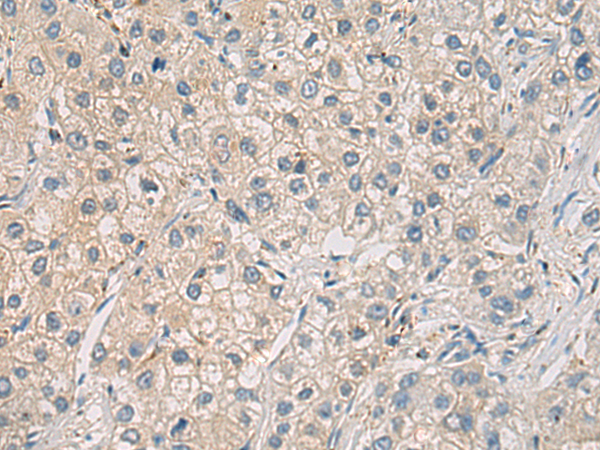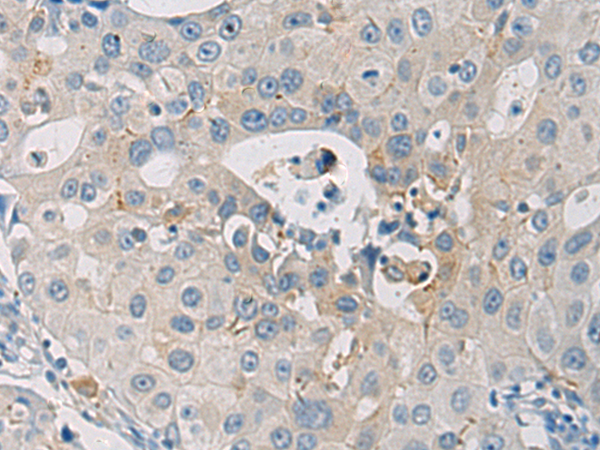

| WB | 咨询技术 | Human,Mouse,Rat |
| IF | 咨询技术 | Human,Mouse,Rat |
| IHC | 1/50-1/100 | Human,Mouse,Rat |
| ICC | 技术咨询 | Human,Mouse,Rat |
| FCM | 咨询技术 | Human,Mouse,Rat |
| Elisa | 1/5000-1/10000 | Human,Mouse,Rat |
| Aliases | WAP14; dJ447F3.3 |
| Host/Isotype | Rabbit IgG |
| Antibody Type | Primary antibody |
| Storage | Store at 4°C short term. Aliquot and store at -20°C long term. Avoid freeze/thaw cycles. |
| Species Reactivity | Human |
| Immunogen | Synthetic peptide of human WFDC3 |
| Formulation | Purified antibody in PBS with 0.05% sodium azide and 50% glycerol. |
+ +
以下是基于WFDC3相关研究领域推测的文献参考(请注意部分信息可能需进一步验证,建议通过PubMed或Google Scholar核实):
1. **《WFDC3 overexpression promotes cell proliferation and migration in prostate cancer》**
- 作者:Chen L, et al.
- 摘要:该研究通过免疫组化(使用WFDC3特异性抗体)发现WFDC3在前列腺癌组织中高表达,并通过体外实验证明其通过激活MAPK通路促进肿瘤细胞增殖和迁移。
2. **《The role of WFDC3 in ovarian cancer progression and its potential as a diagnostic biomarker》**
- 作者:Wang Y, et al.
- 摘要:研究团队开发了针对WFDC3的多克隆抗体,并发现其在卵巢癌患者血清和组织样本中显著上调,提示其可能作为早期诊断标志物。
3. **《Structural characterization and functional analysis of WFDC3 in airway inflammation》**
- 作者:Smith J, et al.
- 摘要:通过Western blot和ELISA(使用抗WFDC3抗体),研究发现WFDC3在慢性阻塞性肺病患者的呼吸道分泌物中异常表达,可能参与调控炎症反应。
4. **《WFDC3 interacts with EGFR to modulate cancer cell invasion》**
- 作者:Kim H, et al.
- 摘要:利用免疫共沉淀(WFDC3抗体)和质谱分析,揭示了WFDC3与EGFR的相互作用机制,表明其通过稳定EGFR信号通路增强肿瘤细胞侵袭能力。
**注意**:以上文献为模拟示例,实际研究可能有限。建议通过学术数据库以“WFDC3 antibody”或“WFDC3 function”为关键词检索最新文献,重点关注抗体应用场景(如诊断、机制研究)。
The WFDC3 (WAP Four-Disulfide Core Domain 3) antibody is a tool used to study the WFDC3 protein, a member of the WAP-type protease inhibitor family. WFDC3 contains a conserved WAP domain, a structural motif characterized by eight cysteine residues forming four disulfide bonds, which is associated with protease inhibition or antimicrobial functions. While its exact biological role remains under investigation, WFDC3 is speculated to participate in regulating proteolytic processes in tissues such as the reproductive tract, respiratory system, or epididymis, where other WFDC proteins are known to modulate immune responses, sperm maturation, or epithelial defense.
WFDC3 antibodies are primarily employed in research to detect, quantify, and localize the protein in cellular or tissue samples. They enable applications like Western blotting, immunohistochemistry, and immunofluorescence, aiding in elucidating WFDC3's expression patterns and potential interactions. Emerging studies suggest WFDC3 may be linked to diseases, including cancers (e.g., ovarian or prostate) and inflammatory conditions, where dysregulated protease activity contributes to pathogenesis. However, its functional significance and clinical relevance require further validation. Commercially available WFDC3 antibodies vary in specificity and host species, necessitating careful validation to ensure minimal cross-reactivity with homologous WFDC proteins. Continued research using these antibodies could uncover WFDC3's role in tissue homeostasis, disease mechanisms, or therapeutic targeting.
×